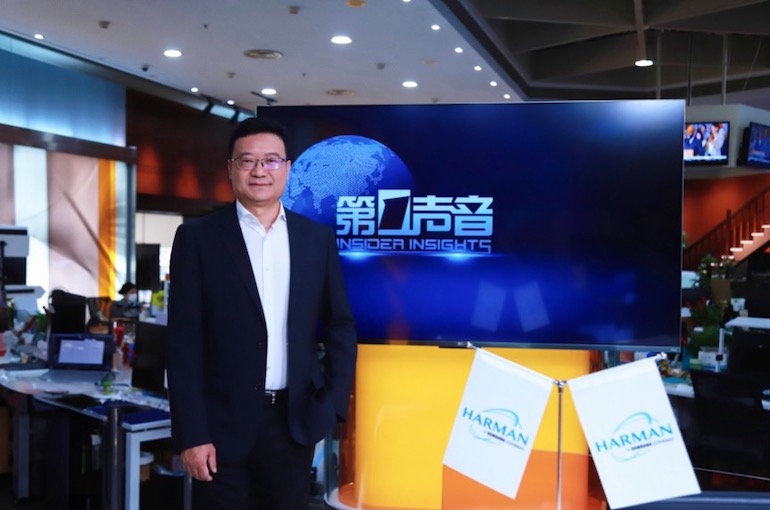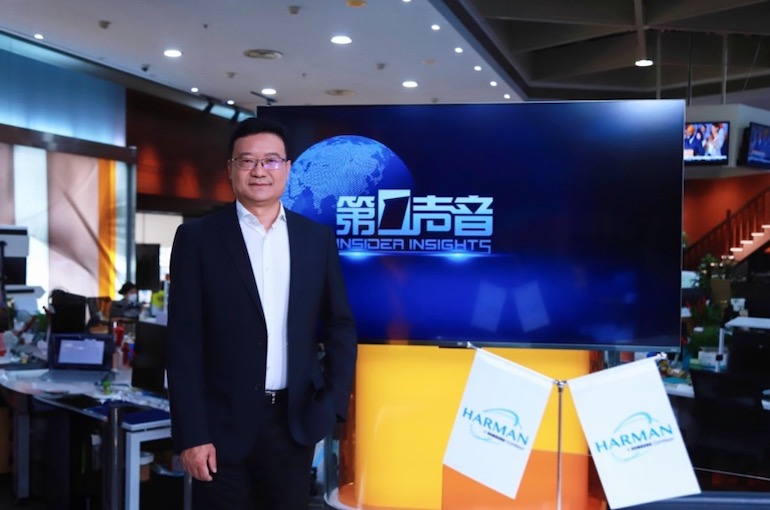
(Yicai) Oct. 8 -- China is at the forefront of intelligent transformation, so succeeding in the country is essential for global success, according to the Senior Vice President of HARMAN Automotive Division, Customer Group APAC, Mr. Yuzhan Liu.
Almost all companies are formulating targeted strategies for China, leveraging market changes to drive internal innovation, meet local demand, and potentially start global trends before expanding overseas, Yuzhan Liu told Yicai in a recent interview.

Mr. Yuzhan Liu, Senior Vice President of HARMAN Automotive Division, Customer Group APAC
HARMAN owns several well-known brands, including AKG®, Harman Kardon®, Infinity®, JBL®, Lexicon®, Mark Levinson® and Revel®. HARMAN Automotive generates more than half of HARMAN's total sales, thanks to its car audio product, digital cockpit solution, connectivity solutions and engineering services. It established close partnerships with global automotive giants, such as Mercedes-Benz, BMW, and Audi. Its technological advantages include artificial intelligence, augmented mixed reality, and machine learning.
Since 2018, HARMAN Automotive has formulated a detailed AI strategy focused on integrating machine learning and neuroscience skills. It is the only company capable of applying AI for cognitive load monitoring, analysis, classification, and intervention to the automotive industry.
Rapid Growth in China Amid Smart Transformation
Last year, HARMAN Automotive set a goal to double its business in China within five years. This is an ambitious target, given the difficulties many auto parts suppliers face in intelligent transformation.
Anticipating user needs and investing in new product development are the main points that led to HARMAN Automotive's rapid growth in China, Liu pointed out.
Thanks to its experience in consumer audio, HARMAN can better explore deep consumer demands and invest early in new product development, bringing mature technologies to market quickly, thus providing clients with a competitive advantage, Liu added. For customers, this means acquiring relatively mature products that can be available quickly for a reasonable price.
Automotive products are becoming more and more like consumer electronics because of their faster update cycle, Liu said. In some cases, autos can also be seen not only as means of transportation but also as a mobile living space and a seamless extension of consumers' connected lifestyles.
Following the company’s vision of “Consumer Experiences, Automotive Grade”, HARMAN has launched the Ready Solutions, which covers most of the aspects of the cockpit experience to meet the new market demand, Liu said.
The Ready Solutions includes Ready Connect, a 5G telematics control units (TCUs) that enables product upgradability, Ready Vision QVUE & AR HUD, which integrates the most important visual needs for consumers, Ready Care, an in-cabin monitoring product, Ready Upgrade, product-grade domain controllers, software, accessories and tools to reduce time to market and cost by upgradability, and Ready Display, a automotive display solution powered by Samsung Neo QLED.
The uniqueness of the Ready Solutions lies in its product development model, which consists of carrying out extensive preliminary development work on the latest market trends while autonomously defining the product roadmap, Liu explained. This approach enables automakers to quickly apply mature products while ensuring upgradability and iterability throughout vehicles' lifecycle.
An important detail is that HARMAN lays out product roadmaps before customers release demand. This shortens products' marketing time and reduces costs for carmakers.
The keys are fully understanding and anticipating end-user needs, investing early, and maintaining a long-term model of iterability and upgradability to maximize consumer benefits, Liu said.
Strong R&D Support
In order to provide rapid support to Chinese automakers, HARMAN Automotive has established a large R&D team, with over 1,200 R&D engineers in China accounting for about one-third of the company's total workforce, HARMAN has fully integrated its Chinese operations into its global development system.
HARMAN has four advanced R&D, engineering, and design centers in Shanghai, Suzhou, Chengdu, and Shenzhen, making China an integral part of its global R&D system, with capabilities for full-stack smart cockpit and audio and multimedia-related software development. This large-scale R&D team is rare among Chinese automakers and automotive electronics supplies.
Notably, HARMAN's entire R&D staff is comprised of development engineers but does not include technical support. Compared to other automotive suppliers, talents in HARMAN's Chinese R&D team primarily have a background in the consumer electronics and communications industries, which are crucial for intelligent transformation.
While acknowledging the significant trend of consumerization in the automotive sector, Liu emphasized that cars will not become purely consumer electronic products. Automobiles remain a means of transportation that must prioritize safety and reliability, he said. However, a car is so much more than just a car today. It’s an extension of drivers, their personality and their lifestyle. Our goal at HARMAN is to provide a consumer experience while ensuring automotive grade.
Embracing Competitive Challenges and New Changes
Auto suppliers like HARMAN faces new challenges in China's rapidly evolving automotive landscape. Addressing the trend of automakers seeking self-reliant development of key technologies such as battery packs, intelligent cockpits, and autonomous driving systems, Liu acknowledged the benefits of this approach.
In-house development allows for more efficient upgrades and iterations, Liu noted. It offers complete control and rapid response. However, it also requires enormous investment to establish comprehensive capabilities in complex automotive intelligent systems.
Taking car audio systems as an example, Liu pointed out that achieving optimal performance in a dynamic automotive environment requires involvement from the early stages of vehicle design, including styling and interior space planning. The tuning and system design of audio systems demand years of experience and accumulated knowledge, which cannot be acquired in a short period.
Recognizing the growing trend of young Chinese consumers viewing cars as mobile digital spaces, Liu emphasized the importance of adaptability. Despite fierce competition in China's auto market, companies that can quickly meet the demands of Chinese consumers will gain a competitive edge, he said.
Liu believes that success in China can provide valuable experiences applicable to other markets, supporting the rapid transformation of the entire organization. The rich experiences accumulated in the Chinese market can be leveraged worldwide, he stated. This challenging environment motivates HARMAN to continuously improve its work methods and respond to market changes more efficiently and flexibly, ensuring its continued success in the dynamic Chinese automotive market and beyond.